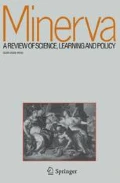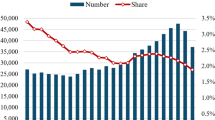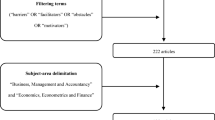Abstract
The new prominence given to science for economic growth and industry comes with an increased policy focus on the promotion of commodification and commercialization of academic science. This paper posits that this increased interest in commodification is a new steering mechanism for governing science. This is achieved by first outlining what is meant by the commodification of scientific knowledge through reviewing a selection of literatures on the concept of commodification. The paper concludes with a discussion of how commodification functions as a means for governing science.
Similar content being viewed by others
Notes
Compensating for market failure is one of the central arguments for public investment in R&D and the rationale is that the state invests in R&D that would be unlikely to or have difficulty in attracting private investors.
References
Biagioli, Mario. 2006. Patent republic: Representing inventions, constructing rights and authors social research. Social Research 73: 1129–1172.
Böhme, Gernot. 2003. Contribution to the critique of the aesthetic economy. Thesis Eleven 73: 71–82.
Callon, Michel. 1994. Is science a public good? Science, Technology and Human Values 4: 395–425.
Coase, Ronald H. 1974. The market for goods and the market for ideas. American Economic Review Papers and Proceedings 64: 384–391.
Dale, Roger. 2007. Repairing the deficits of modernity: The emergence of parallel discourses in higher education in Europe. In World yearbook of higher education, eds. Debbie Epstein, Rebecca Boden, Rosemary Deem, Rizvi Fazal, and Susan Wright, 14–31. UK: Routledge.
Everett, Margaret. 2003. The social life of genes: Privacy, property and the new genetics. Social Science and Medicine 56: 53–65.
Geuna, Aldo, and Alessandro Muscio. 2009. The governance of university knowledge transfer: A critical review of the literature. Minerva 47: 93–114.
Godelier, Maurice. 1999. The enigma of the gift. Oxford: Polity Press.
Green, Ronald M. 2001. What does it mean to use someone as “a means only”: Rereading Kant. Kennedy Institute of Ethics Journal 11: 247–261.
Harvey, David. 2001. Spaces of capital: Towards a critical geography. Edinburgh, UK: Edinburgh University Press.
Haug, Wolfgang F. [1971] 1986. Critique of commodity aesthetics, trans. R. Bock. Cambridge: Polity Press.
Holland, S. 2001. Contested commodities at both ends of life: Buying and selling gametes, embryos, and body tissues. Kennedy Institute of Ethics Journal 11: 263–284.
Katches, Mark, William Heisel, and Ronald Campbell. 2000. Donors don’t realize they are fueling a lucrative business. Orange County Register (16 April). Online at http://www.ocregister.com/health-fitness/features/body/ index.shtml. cited in Holland, Suzanne 2001. Contested commodities at both ends of life: Buying and selling gametes, embryos, and body tissues. Kennedy Institute of Ethics Journal 11: 267.
Kaushik Sunder, Rajan. 2006. Biocapital: The constitution of post-genomic life. Durham: Duke University Press.
Kitcher, Phillip. 2001. Science, truth, and democracy (Oxford Studies in Philosophy of Science). Oxford, UK: Oxford University Press.
Kleinman, Daniel Lee, and Steven P. Vallas. 2001. Science, capitalism, and the rise of the “Knowledge Worker”: The changing structure of knowledge production in the United States. Theory and Society 30: 451–492.
Kopytoff, Igor. 1986. The cultural biography of things: Commoditization as process. In The social life of things: Commodities in cultural perspective, ed. A. Appadurai. Cambridge, UK: Cambridge University Press.
Krimsky, Sheldon. 2003. Science in the private interest. Has the lure of profits corrupted biomedical research?. New York: Rowman and Littlefield Publishers Inc.
Latour, Bruno, and Woolgar, Steve. 1986. Laboratory life: The construction of scientific facts. Princeton, USA: Princeton University Press.
Lyotard, Jean-Francois. 1991. The postmodern condition: A report on knowledge, trans. Geoff Bennington and Brian Massumi. Oxford, UK: Manchester University Press.
Mäki, Uskali. 1999. Science as a free market: A reflexivity test in an economics of economics. Perspectives on Science 7: 486–509.
Marx, Karl. 1990. Capital: A critique of political economy. Trans. Ben Fowkes, vol. 1. New York: Penguin.
McSherry, Corynne. 2001. Who owns academic work? Battling for control of intellectual property. USA: Harvard University Press.
Merton, Robert K. 1942. The normative structure of science. In The sociology of science: Theoretical and empirical investigations, ed. Robert K. Merton. Chicago, IL: University of Chicago Press. 1973.
Mirowski, Philip, and Esther Mirjam-Sent. 2002. Introduction. In Science bought and sold: Essays in the economics of science, eds. Philip Mirowski, and Esther Mirjam Sent, 1–66. Chicago, IL: The University of Chicago Press.
Mirowski, Philip, and Robert van Horn. 2005. The contract research organization and the commercialization of scientific research. Social Studies of Science 35: 503–548.
Morris, Ian. 1986. Gift and commodity in archaic Greece. Man 21: 1–17.
Owen-Smith, Jason. 2003. From separate systems to a hybrid order: Accumulative advantage across Public and Private Sciences at Research One Universities. Research Policy 32: 1081–1104.
Pestre, Dominique. 2005. The technosciences between markets, social worries and the political: How to imagine a better future? In The public nature of science under assault: Politics, markets, science and the law, eds. Helga Nowotny, Domique Pestre, Eberhard Schmidt-Aßmann, Helmut Schultze-Fielitz, and Hans-Heinrich Trute. Berlin: Springer.
Prasad, Amit. 2009. Capitalizing disease: Biopolitics of drug trials in India. Theory, Culture & Society 26: 1–29.
Radin, Margaret. 1996. Contested commodities: Trouble with trade in sex, children, body parts and other things. Cambridge, USA: Harvard University Press.
Rhoten, Diana, and William Powell. 2007. The frontiers of intellectual property: Expanded protection vs. new models of open science. Annual Review of Law and Social Science 3: 345–373.
Rip, Arie. 1994. The republic of science in the 1990s. Higher Education 28: 3–23.
Siegel, Donald S., Mike Wright, and Andy Lockett. 2007. The rise of entrepreneurial activity at universities: Organizational and societal implications. Industrial and Corporate Change 16(4): 489–504.
Stephan, P.E. 1996. The economics of science. Journal of Economic Literature 34: 1199–1235.
Thrift, Nigel. 2006. Re-inventing invention: New tendencies in capitalist commodification. Economy and Society 35(2): 279–306.
Tinic, Serra A. 1997. United colors and untied meanings: Benetton and the commodification of social issues. Journal of Communication 47: 3–25.
Turner, Stephen. 2002. Scientists as agents. In Science bought and sold: Essays in the economics of science, eds. P. Mirowski, and E. Mirjam Sent, 362–384. Chicago, IL: The University of Chicago Press.
Valentin, Finn, and Rasmus Lund Jensen. 2006. Effects on academia–industry collaboration of extending university property rights. The Journal of Technology Transfer 32(3): 251–276.
Walstad, Allan. 2002. On science as a free market. Perspectives on Science 9: 324–330.
Weisbrod, Burton, Jeffrey Ballou, and Evelyn Asch. 2008. Mission and money: Understanding the university. New York: Cambridge University Press.
Williams, Colin. 2002. A critical evaluation of the commodification thesis. The Sociological Review 525–542.
Author information
Authors and Affiliations
Corresponding author
Rights and permissions
About this article
Cite this article
Jacob, M. On Commodification and the Governance of Academic Research. Minerva 47, 391–405 (2009). https://doi.org/10.1007/s11024-009-9134-2
Published:
Issue Date:
DOI: https://doi.org/10.1007/s11024-009-9134-2




